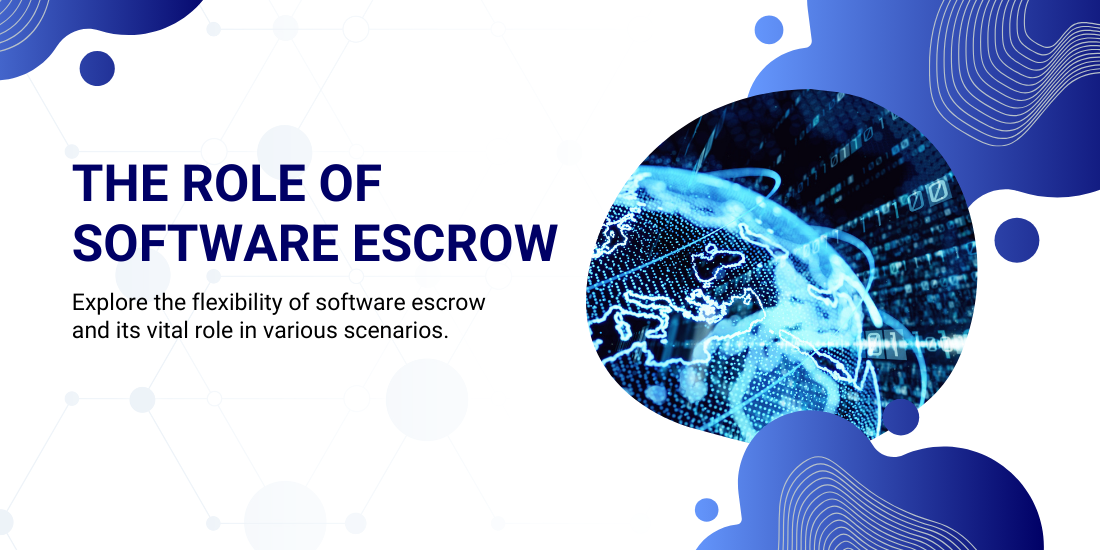Exploring the Versatility of Software Escrow: Ensuring business continuity and resilience
In today’s rapidly evolving technology and business landscapes, where innovation is constant and digital assets are a necessity to operations, ensuring the security and availability of software applications is vital. This is where software escrow can offer a helping hand – an agreement that offers reassurance and protection to stakeholders across various relationships and industries.
In this blog, we’ll explore the flexibility of software escrow and its vital role in various scenarios. From third-party developers working on behalf of companies to licensed software customers, SaaS users, project owners with subcontractors, investors in tech ventures and organisations handling sensitive data, the need for software escrow is a must have for all.
What is Software Escrow?
Before we explore the different scenarios, it’s essential to understand the basics of software escrow, also known as source code escrow.
Software escrow has been around since the inception and use of software. It’s a solution aimed at mitigating risks between two parties or on behalf of an IP owner, by holding critical software assets in trust with an intermediary party (the software escrow company), these assets can then be released and utilised should certain pre-defined events happen such as supplier failure or bankruptcy.
Software escrow used to predominantly focus on providing access to source code but can also contain other IP or sensitive materials. The change in delivery models away from traditional on-premise hosting to Software as a Service (SaaS) for example, has meant other options and considerations when designing a software escrow solution have to be thought through or adopted.
Similar to software escrow, where critical software source code is stored with an independent third party, SaaS escrow is used to protect SaaS applications and applies the same logic to the entire cloud environment including the data hosted by the supplier usually within AWS, Microsoft Azure or Google Cloud. It allows businesses to protect their data that resides within cloud environment applications managed and delivered by a third party, protecting them against supplier failure or incidents.
Software Escrow: Applications in Different Relationships and Industries
As explained above, software escrow and SaaS escrow serves as a protective measure, offering assurance to various stakeholders in different scenarios. It can be used in a number of different scenarios, some of the most common ones are described below:
- Licensed Software Customer: The most common situation is businesses licensing third-party software, whether that be as a traditional software product or SaaS (Software as a Service) application. A software escrow/SaaS escrow agreement can be used to mitigate supplier risks. By depositing the source code, databases, deployment scripts and relevant documentation into software escrow or SaaS escrow, the software vendor assures the customer of continued access to the software and client data in case they go out of business or fail to fulfil their contractual obligations. This safeguards the customer’s investment and ensures continuity of their critical software systems.
- Licenced Customer in Regulated Market: With the growing importance on cloud based and third party technologies, many markets such as the financial industry and regulations such as PRA SS2-21 in the UK, Digital Operations Resilience Act (DORA) across the EU and APRA CPS 230 in Australia are enforcing stricter regulations on the use of material outsourced contracts and suppliers. These regulations are specifically tightening on the importance of continuity planning, testing and stressed exit planning to ensure operations can continue. Software escrow falls into a holistic approach to third-party risk mitigation.
- Third-Party Developer Building on Behalf of a Company: An organisation who has hired a third-party developer to create a custom software solution may insist on arranging a software escrow agreement during initial development and throughout the lifecycle or management of the software. The source code and other critical assets such as deployment scripts or databases are deposited and securely stored with a neutral software escrow company. If the developer fails to meet their obligations, such as software maintenance or updates or other incidents outside of the control of the customer, they can request access to the software assets through the software escrow company, allowing them to continue using and maintaining the software or making it available to their own clients.
- Project Owner with Subcontractors in Government/Industrial Contracts: Government and industrial contracts often involve complex projects with multiple subcontractors responsible for delivering various technological components as part of an overall derivable. In such scenarios, software escrow acts as a risk management tool for the main contracting party. Project owners can require subcontractors or suppliers to deposit source code, databases, deployment scripts, documentation and other intellectual property securely with a software escrow company. This ensures that the project remains on track even if a subcontractor fails to fulfil their obligations or runs into financial difficulties.
- Investors in a Tech Company: Investors inject capital into tech companies with the expectation of returns on their investments. However, the success of a tech company heavily depends on its intellectual property and software. To mitigate investment risks, investors may incorporate software escrow agreements as part of their investment deals. This ensures that critical assets are protected and can be made available if needed based on certain metrics, performance or failure.
- Data Holding or Information Escrow Agreements for Peace of Mind: In an era where data privacy and security are vital, organisations handling sensitive data seek reassurance through data holding agreements or for their own business continuity and disaster planning. These agreements often incorporate elements of software escrow, ensuring that the systems, applications and IP are accessible and functional at all times. This not only safeguards the organisation’s reputation but can also ensures compliance with regulatory requirements.
In conclusion, software escrow/SaaS escrow serves as a vital tool for mitigating risks and safeguarding assets and sensitive IP across a spectrum of scenarios and relationships. Whether it’s protecting investments, ensuring business continuity, or complying with regulatory standards, software escrow offers a layer of security and assurance in an ever-evolving technological landscape. By understanding its applications and implementing appropriate software escrow agreements, businesses can navigate uncertainties with confidence, knowing that their digital assets are protected.
##
About Escrow London
Escrow London is a global software and SaaS escrow company with offices in London, UK, and Sydney, Australia. Our North American division called The Escrow Company, is based in Atlanta, US.
We have invested considerable resources into innovation to reinvent software escrow for a SaaS world. Escrow London provides a range of SaaS continuity escrow solutions suitable for AWS, Microsoft Azure and Google Cloud hosted SaaS applications. We support a wide range of clients includes major law firms, banks, central banks, insurance companies, technology companies and government organisations.
To find out more about Escrow London and our software escrow and SaaS continuity escrow solutions, visit our YouTube channel.








